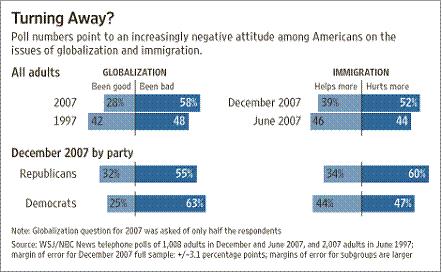| Dear Friends, As the cohort on the front lines of our participation in the rapidly globalizing world economy, this doesn’t sound like a very happy Christmas present for us. And it could very well go from bad to worse next year as the candidates use these arguments to hit each other over the head and try to impress their increasingly anxious but sadly no-nothing home community voters. Déjà vue all over again, n’est pas? Take care and happy holidays. | Americans' Anti-Global Turn May Stir Race for President By GREG HITT, Wall Street Journal, December 20, 2007 WASHINGTON -- On the eve of the election year, Americans are displaying increasingly severe doubts about the nation's economic engagement with the rest of the world. The latest Wall Street Journal-NBC News poll shows a deterioration in public support for globalization and immigration, reinforcing the importance of those issues -- along with broader concerns about the faltering economy -- in the fight for the White House and Congress. Democrat Peter Hart, who conducted the poll with Republican counterpart Bill McInturff, suggested the souring sentiment could stir up the "rhetoric of protectionism," as both parties scramble to capitalize. "This is not a year where cooler heads are likely to prevail," Mr. Hart said. The standard-bearers that emerge from the primary season will face a major decision: Do they attempt to lead the U.S. public toward more global economic engagement, a potentially perilous political gambit? Or do they fan public anxiety and ride the resulting waves of discontent toward the polls. Karan Bhatia, until recently a top trade negotiator for Mr. Bush, said trade supporters must "do a better job" of communicating with the public. "There's no question there's some level of uncertainty and concern with globalization, and how the U.S. fits into the global economy," he said, noting the nation embraced engagement after World War II and reaped the benefits. As recently as June, a plurality of Americans, 46% to 44%, said immigration helps more than it hurts the nation. Now a large majority says immigration hurts more than it helps. According to the poll, 52% said immigration hurts the country more than it helps, with only 39% seeing immigration having a positive contribution. Immigration is often a bellwether of public sentiment on global engagement, and concern can be seen across parties and incomes. Clear majorities of blue- and white-collar workers said immigration hurts the nation more than it helps. Only those identified as professionals and managers approved, by a 52% to 41% ratio. Republicans overwhelmingly voiced concerns with immigration, mirroring the presidential primary candidates, but Democrats, too, expressed similar feelings, albeit to a lesser extent. The nation's integration into the global economy began to accelerate in the mid-1990s, as barriers to trade and capital flows fell around the world. The transformation has opened markets for U.S. exporters and given consumers access to low-cost goods made abroad. But the changes have come with a cost, as tens of thousands of American manufacturing jobs have been shipped overseas, and 58% of those polled said the tradeoffs haven't been worth it. Only 28% said globalization has been a good thing. That is a shift from 10 years ago, when the nation was more evenly split. At that time, 48% said globalization was harmful, with 42% seeing it as good. Blue and white-collar workers were strongly opposed, as were professionals and managers, who by a 50%-37% margin said globalization has been bad for the U.S. Among Republicans, 55% said globalization has been bad for the U.S.; 63% of Democrats agreed. The poll underscores the difficulties President Bush will face next year. The president has virtually no chance of reviving an initiative that would have created a pathway to citizenship for millions of illegal immigrants. Significant hurdles stand in the way of what's left of Mr. Bush's free-trade agenda, including deals that would deepen ties with Colombia, Panama and South Korea. With the campaign to succeed Mr. Bush in full swing, leading presidential contenders are attempting to capitalize on the shift in attitudes. But differing approaches to the issues reflect broader dividing lines between the parties, and may well shape the outcome of the general election next November. Democrats, by and large, have remained sympathetic to immigrant concerns, trying to balance the party's outreach to Hispanics with the rising anti-immigrant sentiment among working-class voters and the union base. At the same time, they have moved away from the party's Clinton-era support for free trade and are voicing skepticism. New York Sen. Hillary Clinton's recent troubles began in part when she struggled to respond to questions about whether drivers' licenses should be given to undocumented immigrants. Write to Greg Hitt at [email protected] |


 RSS Feed
RSS Feed